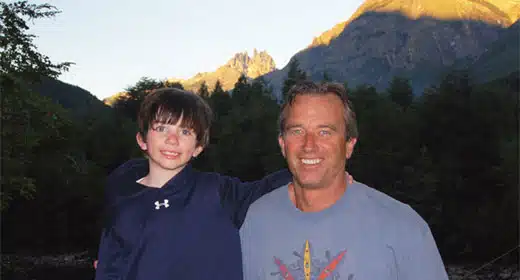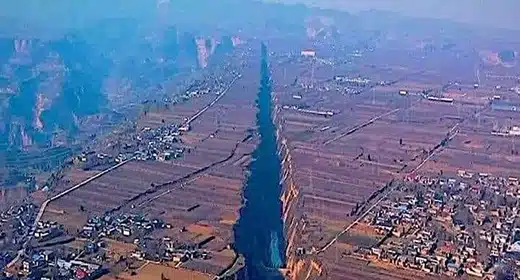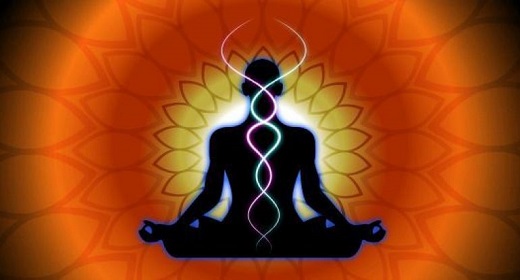by Heidi Smith: See you on the barricades!” is one of Robert Kennedy, Jr.’s signature phrases, and it aptly summarizes his attitude towards fighting the root causes of global warming.  Kennedy is a warrior on the earth’s behalf and one of the most vocal critics of the oil and coal industries’ role in creating the ongoing catastrophe of climate change. His book Crimes Against Nature, soon to become a major motion picture, was a detailed and damning account of corporate cronyism under the Bush administration. Within the past year, his articles in Rolling Stone and Vanity Fair have served as blueprints for how America can effectively give up its dependency on fossil fuels and move into a renewable future.
Kennedy is a warrior on the earth’s behalf and one of the most vocal critics of the oil and coal industries’ role in creating the ongoing catastrophe of climate change. His book Crimes Against Nature, soon to become a major motion picture, was a detailed and damning account of corporate cronyism under the Bush administration. Within the past year, his articles in Rolling Stone and Vanity Fair have served as blueprints for how America can effectively give up its dependency on fossil fuels and move into a renewable future.
Kennedy’s passionate concern for the planet stems from a deeply ingrained love of nature, fostered by a boyhood spent whitewater rafting and exploring. As a child, he wanted to be a veterinarian and today is a licensed falconer. A devout Catholic, he sees environmental work as spiritual work and has written a children’s book about the life of St. Francis of Assisi.
In 1999, Time Magazine named Kennedy as one of its “Heroes of the Planet” for his successful efforts to clean up the Hudson River as chief prosecuting attorney for Riverkeepers. Today he is the senior attorney for the Natural Resources Defense Council and Co- Director of the Pace Environmental Litigation Clinic at Pace University Law Center. He spoke with SC Magazine Editor-in-Chief Heidi Smith about taking back our power from corporate interests and unleashing our collective ingenuity to produce energy in a way that is aligned with nature.
SC: The focus of this issue is on taking back our power, both in the literal sense of weaning ourselves from the dependency on fossil fuels and in the sense of taking responsibility for our part in it. How can we take back our power?
RK: Fossil fuels are a huge drag on American capitalism. They’re not just affecting our health but they’re destroying our international prestige, they’re embroiling us in wars. The current one is going to cost us 3 trillion dollars, along with thousands of American lives and hundreds of thousands of Iraqi lives. Our dependence has beggared an economy that 50 years ago owned half the wealth on the face of the earth. [The oil industry] is transferring those huge holdings to nations that are largely hostile to our interests.
This dependence has destroyed the American dollar, it’s destroyed our international prestige, it’s threatened our national security, it’s caused huge budget deficits and it’s the principal source of our giant and catastrophic trade imbalance. The reason [fossil fuels are] able to prevail in the economy is not because they are particularly efficient at producing energy. Both coal and oil are dependent on huge subsidies, some of them direct, some of them indirect.
I think everybody has to live their lives, look themselves in the mirror and say, “I did my best today to leave a better world for my kids.” As long as I can do that, then I can be satisfied.
Some of them are externalities. The oil industry receives over a trillion dollars of subsidies every year, which are meticulously documented in Terry Tammenin’s book Lives Per Gallon. The coal industry receives probably even more because of the impacts of coal on human health today and on our environment through the destruction of the Appalachian Mountains.
What is the cost of the 1,200 miles of rivers that have now been buried? Four hundred and sixty mountains have been cut down. An area the size of Delaware will soon be flattened to feed our appetite for coal. Today, the mercury that comes from those coal plants has poisoned all of the fish in 19 states and at least some of the fish in 49 states. It also emits acid rain. It has sterilized one fifth of the lakes in the Adirondacks and destroyed the forest cover on the high peaks of the Appalachians from Georgia to Northern Quebec. The ozone and the particulates from coal killed 18,000 Americans a year and they cause a million asthma attacks, a million lost work days a year. And those are externalized costs of coal. There are also many other costs; you go to West Virginia and the roads in West Virginia have 18 inches of asphalt on them that’s paid for by the taxpayers of that state. That’s a huge subsidy to that industry.
So these are not efficient producers of energy. There are far more efficient producers like wind and solar and what we do know is that nations that are able to decarbonize their society immediately experience gigantic economic rewards and huge boosts in prosperity.
SC: You’ve mentioned Iceland and Sweden.
RK: Iceland, which was the poorest country in Europe in 1970, decarbonized its society and today it’s the fourth richest country in the world. Sweden began decarbonizing by slapping $150 tax on carbon and today it’s the sixth richest country in the world by GDP. Brazil is for the first time giving high school education to all of its youth because of the huge build in prosperity that it experienced from decarbonizing its society. California, which is the most energy efficient state in America, also has the most vibrant economy.
The Bush administration will argue that we can’t make ourselves more efficient because it will somehow put China at a competitive advantage. It’s a specious argument; it’s nonsense. You know the utilities cannot move to China. The car owners cannot move to China. Japan spends 7% of it’s GNP on energy. Germany spends 8% of its GNP on energy. The United States spends 15% of its GNP on energy. That means every product that we produce in this country costs 7 or 8 percent more at its birth than an identical product produced in Japan or Germany.
We have to remain politically active. Not just at the national level, not just voting, but running for political office. And that doesn’t mean Congress or the Senate, it means the local school board, it means the planning board, it means the zoning board.
SC: You’ve said is that in order to change this situation, we need political will. You’ve also made the case for the fact that we’re living in a corporatocracy, run by politicians who are beholden to special interests. How can we, as average citizens, get around that fact and make our government work for us better than it currently is?
RK: People have to participate in the democracy. People have to work to inform themselves, use the network to support alternative media like Air America Radio and like these internet sites that are actually giving the news to the American public.
We have to remain politically active. Not just at the national level, not just voting, but running for political office. And that doesn’t mean Congress or the Senate, it means the local school board, it means the planning board, it means the zoning board. That’s what the right wing did beginning in the seventies and they’ve taken over the buttons and the wheels that drive policy in our society. We need to take it back from them.
We have a national grid that’s misaligned. It basically cannot handle the power of millions of entrepreneurs contributing power efficiently to the system.
SC: If we move away from this dependency on fossil fuels and move to renewables, how do you see that impacting the economy?
RK: Well, that’s what we need to do. The obstacle to that is that we have a national grid that’s misaligned. It basically cannot handle the power of millions of entrepreneurs contributing power efficiently to the system. And there are two problems. One is we have 50 different Public Utility Commissions with different sets of rules in each state that deny access to the grid to the most efficient producers.
Secondly, we have a grid that is just not built out. We have enough harvestable wind in North Dakota to power most of the electricity needs of the United States. But the problem is, we don’t have the power lines reaching all those parts of North Dakota that could provide that power. It’s the same in Texas or the desert Southwest. We have enough solar just in the most barren desert lands of the desert southwest, to power all the electrical needs of America even if everybody was driving an electric car. But the power lines don’t reach those areas and we need high voltage AC or DC wires to then carry that energy to the market places where it is needed to carry the electrons. So those are the two obstacles.
We have enough solar just in the most barren desert lands of the desert southwest to power all the electrical needs of America even if everybody was driving an electric car.
You need to have a national backbone that everybody can plug into. If you have solar on your house and there are times of the day that you are producing more energy than you require, you ought to be able to sell the surplus at cost at market rates back to the grid. Well, today you can’t do that in most states. Even the states where you can do it, they don’t give you fair market value. And those producers ought to be able to get fair market value. If we can do that, first of all, and if we can force the administration to take away the subsidies to the oil and coal, you have a renaissance, a great awakening of where millions of entrepreneurs would suddenly flood the space and feed energy to the grid through efficiency, through wind, through solar, through geothermal and through storage capacity.
By storing energy in their car battery and selling it back to the grid during peak hours, people would make huge profits in the process. You’d have all these entrepreneurial ways of making money by creating energy and selling it to the grid, and the oil industry and the coal industry would be quickly out of business.
You’d have all these entrepreneurial ways of making money by creating energy and selling it to the grid, and the oil industry and the coal industry would be quickly out of business.
SC: What’s your view of decentralization and returning some of that to local control?
RK: You’ve got basically four grids in this country. You want to be able to get your power to market. We want industry to grow and develop and in some cases that’s going to require power from outside of the little community. But what we really want is a national market or at least large regional markets where everybody that produces energy can get the maximum return on their investment on their entrepreneurial energies.
SC: You’ve said that the last best hope for solving this issue of dependence on fossil fuels is the free market itself. Could you explain a bit more about what you mean by that?
RK: The other day I was talking to my friend Jim Hightower about the free market and he said, “The free market is a great thing. We should try it some time.” We don’t have a free market in this country, we have a monopoly control and we have crony capitalism. A true free market promotes efficiency. Efficiency means the elimination of waste and pollution is waste. The best thing that could happen to the environment is if we had a true free market because it would cause us to properly value our natural resources and it’s the undervaluation of those resources that causes us to use them wastefully.
But in a true free market, you can’t make yourself rich without making your neighbors rich and without enriching your community. What polluters do is they make themselves rich by making everybody else poor. They raise the standard of living for themselves by lowering quality of life for everybody else and they do that by escaping the disciplines of the free market.
Corporations are externalizing machines. They’re constantly devising ways of shifting their costs, getting somebody else to pay their costs of production. If you’re in the polluting industry the easiest way to do that is to shift your cleanup costs to the public and make yourself a billionaire by poisoning the rest of us. What all the environmental laws passed after Earth Day in 1970 were intended to do was restore free market capitalism in this country by forcing bad actors in the market place to pay the true costs of bringing their product to market. That’s why I say I believe in the free market. We don’t have one now.
The best thing that could happen to the environment is if we had a true free market because it would cause us to properly value our natural resources and it’s the undervaluation of those resources that causes us to use them wastefully.
SC: You obviously know a lot more than the average person about the obstacles that we’re facing in terms of climate change and those imposed by industry. How do you stay inspired?
RK: We have a lot of victories along with a lot of defeats. We have a tremendous number of victories. I think everybody has to live their lives, look themselves in the mirror and say, “I did my best today to leave a better world for my kids.” As long as I can do that, then I can be satisfied. You may lose a battle and you have to be able to say you did your part to try to win it. That’s the way I look at things.
SC: Your uncle famously said, ”Ask not what your country can do for you, but what you can do for your country.” What, in your opinion, is the greatest thing we as citizens can do for our country and for the world at this point?
RK: Get involved in the democracy and let’s return American government to a real democracy rather than the corporatocracy that it has become. We need to be a model again for the rest of the world rather than a bully, an imperial country with a foreign policy that is designed to benefit the mercantile interest of our worst, most greedy corporations. We need to return to our roots as an anti-imperialist nation, one that’s fortified and grew a middle class the way Jefferson wanted it, the way Teddy Roosevelt wanted it, the way that the founders wanted it. That’s what we need in this country but right now the middle class is under assault and we’re seeing this huge gap between rich and poor in our country that is growing. We’re turning into a banana republic.
We need to return to our roots as an anti-imperialist nation, one that’s fortified and grew a middle class the way Jefferson wanted it, the way Teddy Roosevelt wanted it, the way that the founders wanted it.
SC: If we do in fact take back our power, what does the future look like?
RK: It looks like a place where we have cleaner air, cleaner water, where we have restored our national prestige, where we are now a leader among nations, where we’re living sustainably; where we have a balanced budget and we don’t have huge trade deficits, where Americans are working and producing and doing it in an environment that’s healthy. We have a government that’s honest and transparent and that works for the people.
Source: AWAKEN
















































